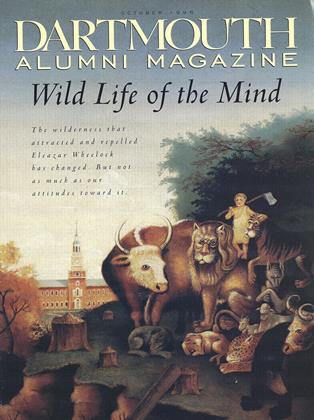The voice that cries in the wilderness has changed. But then, so has the wilderness.
DARTMOUTH WAS FOUNDED ON WILDERNESS. As the wilderness has changed, so has its symbolism—from empty desert to sublime paradise to sinning ground to sickly relativeto vast gym. But all of these wildernesses haVe a common theme: the notion that place makes the College unique. The essajs that follow on the redemptive power of poetry and on the writings of Nelson Bryant 46 illustrate the Green bond between the life of the mind and the life out-of-doors.
To Eleazar Wheelock. wilderness was a place to improve for the glory of God. A New .Light Puritan, he countered Harvard! an corruption by hacking out a place a full 40 miles from the last frontier outpost, just as his forebears had left corrupt Europe for the American "desert" of New England.
A very few years went by before so much of the eastern wilderness was "improved that its scarcity became tangible. During the nineteenth century a few intellectuals turned the Puritan wilderness on its hoary head. Steeped in the German philosophy of the natural man, Thoreau and Emerson argued that wilderness allowed people to get in touch with the wildness within themselves. Ihe poet Richard Hovey, class of 1885, loved that idea. He saw legendary potential for the Upper Valley in the myths of German gods and goddesses. In a feat of poetic grafting, he turned Teutonic mountain deities into mythical Indians. Hovey and his contemporaries listened not for voices crying in the wilderness but for the pure voice that was wilderness: "The clear arousing air comes like a call/ Of bugle notes across the pines, and thrills/ My heart as if a hero had just spoken," Hovey wrote in the poem "Comrades."
Awe is not a permanent state for undergraduates, however, and in the twentieth century the woods surrounding the Hanover Plain became an ideal place to misbehave fai from the cleanly eye. The Outing Club created organized paths to wildness; to this day the DOC remains the largest student group on campus. In the past few decades its more chest-thumping traits have gone the way of the singl-sex College.The DOC has taken on a strong environmental strain, with a division devoted to conservation and classes on low-impact camping. The change reflects a shift toward die idea of wilderness as an organism on the verge of collapse. Campus environmentalism has brought about a renewed outdoor intellectualism among students.
A more utilitarian approach to the land has begun to creep in lately. Rock climbing is now one of Dartmouth's fastest-growing sports. Students are taking to the mountains with a playful purpose and a sense of convenient challenge. This attitude too will shift, just as the Hanover woods have yielded to pasture and pasture to woods again.
But however its nature is interpreted, Dartmouth will always he a place in the wilderness.
Scott Porter '95 ascends an overhang in Arizona. In the extreme-sporting nineties, some students see wilderness as a good place for a workout, a vast gym.
wild life of the mind
 View Full Issue
View Full Issue
More From This Issue
-
 Feature
FeatureThis Man Is an Island
October 1996 By ROBERT SULLIVAN '75 -
 Feature
FeatureNaming the Animals
October 1996 By Robert Pack '51 -
 Feature
FeatureDON'T CALL HIM ANONYMOUS
October 1996 By Jeanhee Kim '9O -
 Feature
FeatureDartmouth's Night
October 1996 -
 Article
ArticleKnowing Your Place
October 1996 By Jim Collins'84 -
 Article
ArticleThe Orange on Campus Is Not on Leaves
October 1996 By "E. Wheelock"
Jay Heinrichs
-
 Cover Story
Cover StoryThe Scholar President
June 1987 By Jay Heinrichs -
 Article
ArticleENGINEERING THE FUTURE
FEBRUARY 1991 By Jay Heinrichs -
 Cover Story
Cover StoryChoices
September 1992 By Jay Heinrichs -
 Feature
FeatureFor The Sake Of Argument
February 1993 By Jay Heinrichs -
 Article
ArticleNels Comes Home
April 1995 By Jay Heinrichs -
 Article
ArticleStatement of Ownership, Management and Circulation (required by 39 U.S.C. 3685).
December 1995 By JAY HEINRICHS
Features
-
 Feature
FeatureThe Honorary Degree Citations
July 1956 -
 Feature
FeatureRETIRING FACULTY
JUNE 1967 -
 Cover Story
Cover StoryRIDE of a LIFETIME
May/June 2013 -
 FEATURES
FEATURESNo Limits
SEPTEMBER | OCTOBER 2022 By CHRIS QUIRK -
 Feature
FeatureSafe Haven
NOVEMBER | DECEMBER 2019 By Jennifer Wulff ’96 -
 Feature
FeatureBoredom's Uses
OCTOBER 1989 By Joseph Brodsky


